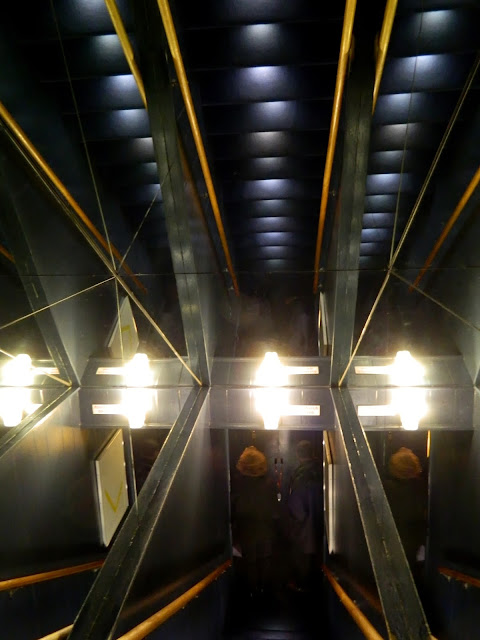We've been continuing our journey southward since our stop in Memphis, passing through Tupelo, Mississippi and staying at the Campground at Barnes Crossing for a few days. It was a very nice little park with large, long sites, though ours, and perhaps others, was not very level. It pushed our level-up system to its maximum and it wasn't very happy about that. We had a couple of beautiful Fall days, with very cool nights, requiring us to fill our fresh water tanks and put away the hose, lest it freeze up. This is a typical winter routine, even this far south.
Tupelo looks to be thriving, with lots of new development around the outskirts, like in Barnes Crossing. Tupelo is also the birthplace of Elvis Presley. His tiny clapboard home is preserved and there is a museum next to it now.
The Natchez Trace also passes through Tupelo, which is the main reason we stopped here. The Natchez Trace Parkway is a long skinny national park that has preserved the approximate route of the original Natchez Trace, a very old foot path dating back to its use by Native Americans. The Chocktaw and Chickasaw people built mounds in the area, some of which can be seen at stops along the Trace. Later, "Kaintucks" or boatmen used the trail to walk back north after dropping their boats off at the mouth of the Mississippi.
We took a day trip north along the Trace to where it crosses the Tennessee River...
...and into Alabama as far as Rock Springs, one of the pull off stops along the Trace. We took a little walk there, crossing the stream that runs from the springs...
...and along one side of the spring, which has been dammed up by a busy beaver.
I had been wanting to drive the Natchez Trace, as it is said to be one of the most beautiful roads in the country. We had also heard that it was not RV friendly, but found this not to be the case. The length limit for RVs is 55', and the height limit is 14'. (We're a little over that length, but under the height.) We learned from locals, and witnessed ourselves during our day trip, that RVs of all lengths travel the Trace. So, we decided to go for it from Tupelo to Jackson.
No problem! It's a very relaxing route, with a speed limit of 50 mph, no commercial traffic (no trucks!!), no services and very limited access. In fact, it felt so RV friendly that we decided it was a good time for me to try driving the truck while towing the RV, for the very first time! It requires more awareness and alertness than driving the car or the truck alone, but on a slow straight haul like this, it was also no problem. I drove for about an hour and then switched back to the car before we got to local roads again. I didn't want to push my luck.
We stopped for a few days at Goshen Springs Campground on Ross Barnett Reservoir, near Jackson, MS. Above is our site. It's a very nice campground for big rigs; almost all the sites are double wide, concrete pads, plenty long, and with plenty of space between sites. Most guests seem to be hunters and fisherman, but the place is fine for anyone. The rate can't be beat: $20/night senior rate, and much lower for extended stays.
While here we drove over to Vicksburg, about an hour away, in the pouring rain. We weren't sure how much we would want to see in the rain, but we thought we'd give it a shot, based on the recommendations of our friends Lynn and Glenn.
We started our visit to Vicksburg with lunch at the Main Street Market Cafe, a surprising treasure near downtown. It's a little two room restaurant, maybe it could be called Southern "shabby chic." Everything on the very complete, but modestly sized menu is $10. I love that! All kinds of deep south/Cajun specialties. I had the red rice and beans.
Anyway, after driving by the riverwall murals and the kind of depressing downtown area, we headed for the battlefield, took in the Visitors' Center where there is a very helpful map of the battlefield with moving lights describing the movement of the regiments during the battles. Then we drove around the battlefield - still in heavy rain and increasing fog.
The highpoint was the USS Cairo (pronounced kay-ro) Museum.
Here is a view of it from under the arched entrance to the museum.
The USS Cairo was one of the ironclad ships used by the Union Navy in the Civil War. It was sunk near Vicksburg by a Confederate mine, and was resurrected from the muddy river bottom and partially restored about 100 years afterwards. In these pictures you'll see it under its huge tent. (Nice in the rain.) The surviving wood and metal parts have been reinforced and supported to suggest what the original looked like.
These two pictures show the iron sides of the ship.
The inside of the museum has displays of what was recovered from inside the ship. Everything was in surprisingly good shape. After taking that all in we headed back to the campground - still raining and getting dark early, as it does this time of year.
Our next stop will be New Orleans, for Thanksgiving and some exploring around. Really looking forward to that!


















































